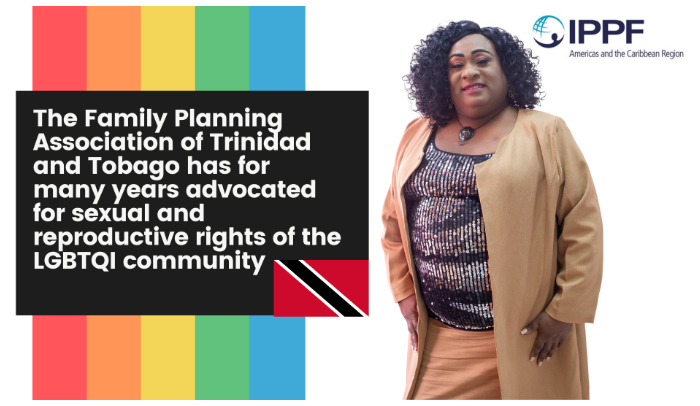
Public perceptions, a lack of education, and government policies contribute to the barriers and challenges to achieving equality for all. In a country as diverse as Trinidad and Tobago, this is especially acute for certain key populations, including the LGBTI+ community.
For Brandy Rodriguez, Healthcare Navigator at the Family Planning Association of Trinidad and Tobago (FPATT), the struggle is both real and personal. In 1999, Brandy began her transition to womanhood and since 2006 has been working with FPATT in their HIV programme for the LGBTI+ community.
“Back in 2004, very little was said about HIV infection, transmission and prevention. In fact, if there was any information, it was misconstrued and meant to stigmatize the LGBTI+ community. I was fairly new to the transgender community, so I made it a mission to research and find out the truths behind HIV and how I could protect myself. I then felt like I had to share what I found with others who were searching as well,” she said.
Overcoming prejudice and stigma
That’s when FPATT asked Brandy to join their team in educating the LGBTI+ community on the types of healthcare available. Stigma surrounding the community forced many to stay hidden and avoid seeking care. Even if a member of the LGBTI+ community wanted to test for their HIV status, they would never dare to go into a public health centre, because of the fear of being judged by the healthcare professionals.
“It’s a simple case of this. When a transgender or non-binary person walks into a health centre or hospital, and the triage nurse has to fill in a form that asks for gender, the only two options there are male and female. So usually, the non-binary person knows that if they want to access that healthcare, free of judgement, they would have to dress as the gender that would bring less attention. At the end of the day, the healthcare provider does not receive accurate information about the client, and the client doesn’t receive the scope of assessment and treatment that may be necessary. So part of what I do, is to simply accompany the client to the appointment so that it’s a less stressful experience and they don’t feel like they are alone,” says Brandy.

The importance of access to HIV treatment and care
Apart from a great lack of healthcare professionals that are willing to treat the LGBTI+ community non-judgementally, the community also lacks social support. Most of the members of the community face barriers to housing and employment, which often means earning a livelihood through sex work. Over 95% of skilled and employable persons within the LGBTI+ community have turned to sex work because they are constantly denied employment within other industries.
“When I began my transition, I was fortunate to have the support of my family; they understood my heart and my need to be my authentic self. Not everyone has that support and so some either migrate or are left homeless because of the fact. Having to work within the sex industry means that they are now at greater risk for HIV or other STIs. My job as an Educator and Navigator is to promote condom use and ensure that they make use of FPATT’s regular HIV testing. If they do test positive, we then have that conversation about U=U, which means that if they [their HIV viral load] are undetectable, they will be untransferable, and then get them to that place of undetectability.”
Brandy explains that being undetectable means that the client’s viral load is suppressed, and they are living healthy lives. The team works hard to ensure clients living with HIV enrol in the FPATT Programme, which supports the importance of adhering to consistent treatment, healthy eating, and rest. As well as testing, the Programme offers sexual and reproductive health education on prevention against STIs and both group and one-to-one sessions to anyone who needs it.
Advocating for support
FPATT has, for many years, advocated for the sexual and reproductive rights of the LGBTI+ community, ensuring that it remains a safe place for HIV testing and counselling. It holds a vision of a world where gender or sexuality are no longer a source of inequality or stigma.
FPATT is poised to become a full-service HIV treatment site, offering antiretroviral treatment as well as psychosocial services for persons affected by HIV. FPATT’s goal is to stop discrimination and stigma against persons living with HIV and ultimately end the spread of HIV within Trinidad and Tobago by 2030.